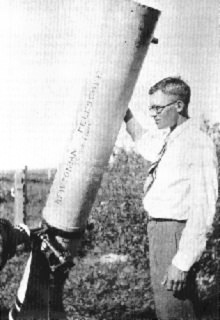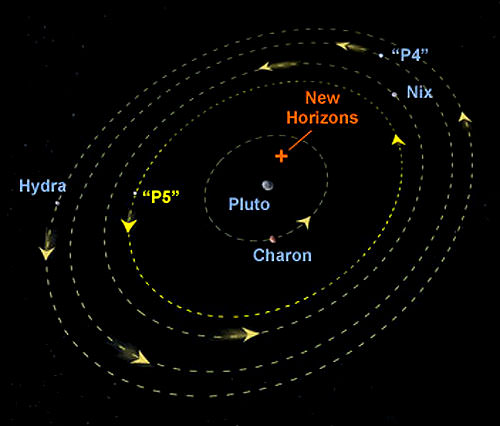As reported here on Universe Today last week, the SETI Institute has invited the public to vote on the names of Pluto’s 4th and 5th moons. Discovered in 2011 and 2012 respectively, researcher and co-discoverer Mark Showalter will take these names before the International Astronomical Union (IAU) after voting closes on February 25th, 2013.
But days after the polling opened, a curious twist in the tale occurred that Star Trek’s Mr. Spock would only describe as “Fascinating.”
William Shatner, James T. Kirk himself, proposed the name Vulcan for one of Pluto’s unnamed moons. Fans and Trekkies worldwide rallied, and as of writing this, Vulcan enjoys a comfortable lead over Cerberus and Styx which are vying for the 2nd place position.
This astronomical horse-race has the propensity to get interesting. In order to be considered, the IAU’s naming convention simply states “Those that share Pluto’s orbital rhythm take the name of underworld deities,” And the named moons of Charon, Nix & Hydra all follow this convention. Shatner’s case for Vulcan does cite the god as “The nephew of Pluto” in Roman mythology, but anyone who had studied Roman and Greek mythos knows that familial relations can be proven between nearly any given god and/or goddess.
Interestingly, Showalter turned down Shatner’s second Star Trek/mythological suggestion of Romulus, citing that Romulus and Remus are already the names of the moons of asteroid 87 Silvia. While the “double naming” of objects in the solar system isn’t unheard of, it may be a definite strike against a proposal. Cerberus, Orpheus, Hypnos & Persephone are all names in the running that are all also assigned to asteroids.
On February 14th, researchers “Opened up the Gates of Hell” a bit further and took more mythological nominations into the running, adding Elysium, Hecate, Melinoe, Orthrus, Sisyphus, Tantalus, Tartarus and Thantos into the fray. You can write-in candidates such as “Donald,” & “Goofy,” but these stand a proverbial snowball’s chance in Hades of being accepted. Perhaps the backing of a starship captain would help, if Adama or Han Solo were available for hire…
Still, one wonders if the name Vulcan will make it past the gate-keepers at the IAU. The IAU has sparked controversy surrounding Pluto before, in its 2006 decision that angered 5th graders everywhere when they demoted Pluto to dwarf planet status. No solar system body currently holds the name of Vulcan, although one hypothetical one once did; the tiny fleeting world that was once thought to be interior to Mercury’s orbit. Several astronomers even claimed to witness transits of the fleeting world across the face of the Sun, and up until the late 19th century, you could still find Vulcan in many astronomy texts. While the idea of Vulcan as a planet interior to Mercury is out (think of how many telescopes, both amateur and professional, now continuously monitor the Sun daily) it’s not out of the question that a small group of asteroids less than 10 kilometres in size tentatively dubbed “Vulcanoids” may still inhabit the space interior to Mercury.

But if nothing else, the poll is a fun exercise to watch as astronomy fans worldwide delve into mythological lore and dig out the names of obscure gods and goddesses. A similar debate on mythological merits swirled around the naming of the moon of dwarf planet Orcus, ultimately named Vanth in 2009.
While only two names will be selected for P4 & P5, the other denizens of the underworld may just get their day in July 2015 when NASA’s New Horizons spacecraft gives us the first close up look at Pluto and friends. Previous “first flybys” of other planets and asteroids have turned up new moons before, and Pluto may be no different.
“The discovery of so many small moons indirectly tells us that there must be lots of small particles lurking unseen in the Pluto system,” stated Harold Weaver of the Johns Hopkins University of Applied Physics Laboratory. Such debris will be a definite concern as scientists seek to thread the spacecraft’s trajectory past Pluto and its moons.

Discovered 83 years ago to the day on February 18th, 1930 by American astronomer Clyde Tombaugh, Pluto remains an uncharted corner of the solar system. Mr. Tombaugh passed away on January 17th, 1997, and an ounce of his ashes are aboard the New Horizons spacecraft which, along with the Pioneer 10 & 11 and Voyager 1 & 2 spacecraft, are escaping the solar system to wander along the galactic plane.
I’ve also got a proposal out in the running. By naming one of Pluto’s moons Alecto, we would honor Clyde with the inclusion of his initials “CT” on a moon. There is precedent for such a clever tribute before; James Christy honored his wife Charlene in the naming of Pluto’s large moon Charon and Mike Brown paid homage to his wife Diane by naming Eris’s moon Dysnomia.
Whatever happens, it’ll be interesting to see what transpires in the final names of P4/P5 are selected. Hopefully it won’t end in a showdown pitting Trekkies against the IAU… but don’t forget, the Trekkies did keep a television series on the air and got a space shuttle re-named!


The preferred term these days is “trekker”.
There’s exo-planets out there that deserve the name Vulcan. Not some damned 50 meter wide rock orbiting a dwarf planet. What is wrong with you people?
Ask JJ Abrams, he blew it up and then jumped ship to a galaxy far far away! lol. I see your point, but how long do we hold out? Why not an exoplanet with life? or hold out till one with intelligent life?
But in the latter case, it would only be right to go with whatever the natives call it…
Not at all. I call a country Spain, the locals Espana.
What was the name of the Klingon frozen prison planet in ST VI? Huropente or something? I think that would be a better suited trek themed name.
Rura Penthe.
I agree.
“Perhaps the backing of a starship captain would help, if Adama or Han Solo were available for hire.”. Star Wars fans in general are not interested in astronomy or science, they just want to see things blow up. Star Trek fans (Trekkies / Trekkers) on the other hand are usually geeks and nerds who are highly intelligent and often get into the sciences. Vulcan for me.
My suggestion is Tweedledee and Tweedledum. Save Vulcan for an Earth sized exoplanet.
There is no reason the IAU should be considered gatekeepers of anything. Their demotion of Pluto remains controversial and not accepted by many astronomers more than six years later. What we really need is a popular initiative aimed at reopening the discussion of Pluto’s planet status and creating a uniform, broad planet definition that takes into account exoplanets as well as all planets, including dwarf planets, in our solar system.
Personally I have no problem thinking of thousands of ways the time and effort that would require could be better spent.
yeah…good try, but no. See outside your walls and you’ll see how different your vission looks.
They are a naming authority, like local post offices and similar government departments here on the ground. Before they came along, there was usually disagreement as nobody had an incentive to use the same names or measurement standards as anyone else, and miscoordination as there was no central registry of names or measurements.
The only reason to respect the IAU is for the harmony they bring to the scientific community. If you don’t want that, you’re free to assign and publish your own names.
“(The IAU’s) demotion of Pluto remains controversial and not accepted by many astronomers…” Citation, please? I’d wager that the majority of astronomers agree with the decision. And why is it a “demotion”? Are planets somehow “better” than Kuiper Belt Objects?
Vulcan can also refer to a volcano that belches up “hell fire,” (except for cryovolcanos) so the name sorta fits. However, I also think Vulcan should be reserved for an exoplanet. Epsilon Eridani has exoplanets, right?
Alpha Centauri B has an Earth-sized planet that is hot as hell (Mercury-like orbit).
I vote for Cerberus because it’s the name of a Greek mythology underworld creature and it’s also a two-headed DOG… like Pluto is also the name of the Disney dog.